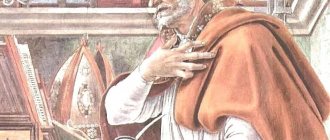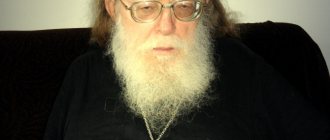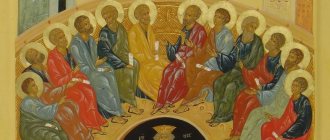St. Augustine's teaching on time
18) Doctrine of the city
He wrote numerous theological and philosophical works, among which “confession” and the main work of his life “The Fence of God” stand out. In his famous "confession" Augustine seeks to encourage other pagans to convert to Christianity. The highest goal of human life, in his opinion, should be love for God and awareness of man’s complete dependence on the Almighty. God is the starting and final point of all human thoughts and actions.
Two cities were created by two kinds of love: earthly - love for oneself, brought to contempt for God, and heavenly love for God, brought to contempt for oneself, the latter in the Lord. The earthly city is a world of evil and Satan, where lust reigns. The City of God is a world of goodness and God. All history is a struggle between two cities, Augustine believed. The main source of faith is the church. And although the soul is immortal, considering the problem of eternity and time, he came to the conclusion that the world is limited in space, and above it is limited in time. His main merit is that
that he gave a philosophical argument for faith.
19) Scholasticism, definition, main problems
Scholasticism (Greek: “scholar, school”) is a systematic medieval philosophy, centered around universities and representing a synthesis of Christian (Catholic) theology and Aristotelian logic.
A prominent representative of scholastic teaching is Thomas Aquinas.
The main problems for the philosophy of Thomas Aquinas, as he writes about it at the very beginning of the Summa Theologica, were divided into three main areas. First of all, this is God, the first subject of philosophy, which constitutes general metaphysics. The second direction of philosophy is the movement of rational consciousnesses towards God, i.e. ethical philosophy. And the third section is Christ as the path leading us to God, i.e. doctrine of salvation.
In the spirit of medieval scholasticism, Thomas Aquinas views philosophy as the handmaiden of theology (ancilla theologiae). Science and philosophy do not exist for their own independent purposes, but in order to help people assimilate the truths of the Christian religion. Theology is a self-sufficient knowledge, a self-sufficient science, but some truths can be acquired by a person not with the help of theological knowledge, but with the help of natural science and philosophy. Therefore, theology uses philosophy and science to more clearly, clearly, and convincingly show people the truths of Christian teaching.
Thomas Aquinas did not ignore the famous problem of universals. As with many provisions, he tried to put an end to endless disputes. On the question of universals, Thomas Aquinas spoke in the same way as Ibn Sina. There are three kinds of universals. First, universals exist in things themselves, in rebus. These universals that exist in things constitute the essence of these things. This is an immediate universal. Universals also exist in the human mind, which, i.e. the mind, through abstraction, extracts, with the help of the active mind, universals from concrete things. Those. universals exist after things, post res. Thomas calls these universals “mental universals.” But, in addition, universals also exist in the divine mind, before things, ante res. These universals are the ideas or original forms contained in the divine mind, and only God is the first cause of all things, only He thinks in Himself the patterns of all things. Thus, Thomas Aquinas reconciles the positions of realists, nominalists, and conceptualists, arguing that universals exist both in the Divine mind, before things, and in the things themselves, and after things, i.e. in the human mind.
20) Anselm of Canterbury, Thomas Aquinas
Thomas Aquinas (1225-1274) Knowledge, according to Aquinas, has intelligence, but what is even more necessary for a person is faith. The most important part of the philosophy of Thomas Aquinas is his doctrine of being, which he developed, relying primarily on Aristotle, in particular, on his ideas about the relationship between matter and form. According to Aquinas, only the Most High possesses eternal existence. He had the opportunity to create any world, but he created the one in which he lives. This world is unique and finite in space, has a coming existence and is characterized by matter and form. An example of the existence of non-material forms can be celestial beings - angels. In material things, it expresses the general content (essence) of a thing, while matter explains the individuality and specificity of its existence. Depending on how form is realized in things, form distinguishes four levels of them
of being: 1. Represented by inorganic, inert nature, where the form expresses the “surprising” essence of things; 2. World of plants. Here the form acts as the final cause, setting expediency, as if forming bodies from the inside; 3. Here the form acts as an efficient cause, determining both the goal and the active principle of existence - how animals are structured; 4. The form already represents the spirit or human rational soul.
⇐ Previous3
Recommended pages:
The problem of measuring time according to the works of St. Augustine
Now let's move on to the problems of knowing time and measuring it.
Augustine examines the concept of the present
,
past
and
future
. By using the method of fragmenting time intervals, Augustine comes to the understanding that the present is compressed into an instant: the current day does not remain entirely in the present, but has hours preceding a certain moment (past) and subsequent ones (future); the same fate befalls the hours, minutes, seconds. Only a moment that can no longer be divided into parts can be called real; but how to grasp it? Because if the moment had at least some duration, it could be divided into “before” and “after”, but then this is no longer the present, but again fragments of the past and future (see: Confession. 11, XV) .
So, the present is vanishingly small, it is so insignificant that it is impossible to “grasp” it. But no less difficulties are associated with the past and the future. You can't talk about something that doesn't exist. If the past no longer exists at all, then how could people tell about it truthfully? If predictors see the future, then it also exists, hiding in some hiding place. This means that when speaking about the past and the future, we must acknowledge their existence (Confession 11, XVI). But where do they exist? “Allow me, Lord, my Hope, to continue asking, so that my searches will not lead me into confusion. If both the future and the past exist, I want to know where they are. If I am not yet capable of this knowledge, then I still know that wherever they are, they are not the past and the future, but the present. If there the future is the future, then it is not there yet; if the past is the past, it is no longer there. Wherever, therefore, they may be, whatever they may be, they exist only as the present” (Confession 11, XVIII).
Where does the past exist? In mind. When talking about the past, people extract from memory not the events themselves, but images, memories of these events: “My childhood, for example, is no longer there, it is in the past, which no longer exists, but when I think about it and talk about it, I see an image of it in the present, for he is still alive in my memory” (Ibid.).
Discussing the “location” of the future, Augustine makes an assumption about the nature of predictions: from existing images we discern those that do not yet exist. The subject of consideration is in the future. When they say that they see the future, they actually see not it, but those signs and causes of it that already exist in the present: “Let one example serve as an explanation, but there are many of them. I see the dawn and already announce in advance that the sun will rise. What I see is real; what I declare is the future; in the future, not the sun - it already exists - but its sunrise, which does not yet exist. If I had not imagined this sunrise in my soul, as I imagine it now when I talk about it, I would not have been able to predict it. Neither the dawn that I see in the sky is the sunrise, although it precedes it; nor the imaginary picture of him in my soul; but I see both in the present and declare in advance that the sun will rise” (Ibid.).
One thing is clear: there is no future and no past, and therefore it is more correct to say, Augustine admits, that there is a present of the past (memory), a simple present (contemplation) and a present of the future (expectation). These three times exist in our soul and nowhere else.
Significant difficulties arise with the question of measuring time: “We measure, as I said, time while it passes, and if someone said to me: “How do you know this?”, I would answer him: “I know, because that we measure it; We cannot measure what does not exist, and there is no past and future.” How can we measure the present when it has no duration? It is measured, therefore, while it passes; when it has passed, it cannot be measured: there will be nothing that can be measured. But where does time come from, in what way and where does it go while we measure it? Where else if not from the future? Which way? Only through the present. Where else but to the past? From that, therefore, which does not yet exist; through that which has no duration, to that which no longer exists. What are we measuring if not time in some interval?” (Confession 11, XXI).
Any standard segment with which we could measure time does not exist in the present, because the present itself does not have the duration to store a time standard. So, the measure itself, if it exists, is made up of the past and future, which do not actually exist! Therefore, it is also unclear not only “ what we are measuring”
", but also with the help of what.
Augustine suggests that the measure of time is the movement of bodies: “I heard from one learned man that the movement of the sun, moon and stars is time, but I do not agree with this. Why then not consider the movement of all bodies as time? If the heavenly bodies stopped, and the potter’s wheel continued to move, then there would be no time by which we would measure its revolutions?” (Confession. 11, XXIII).
But even here Augustine does not see the answer to the question. After all, the sun could complete its revolution twice as fast, and this would not escape us, so that we could say: “The sun completed its revolution in an interval half as short as usual.” Consequently, regardless of the speed of rotation of the sun (it would be more correct, of course, to say: regardless of the angular speed of the Earth’s rotation around its axis), a certain standard of measurement is present. It is he who does not give us the right to call both the first and second variants of the sun’s rotation equal time intervals. This means that the measure of time is not movement, but something else: “That any body can move only in time, I hear this. You're telling me this. But that this very movement of the body is time, I do not hear this: it is not You who say this” (Confession 11, XXIV).
Even about an object at rest we can say: “It was at rest for such and such a time, but moved for so much time” or: “it stood twice as long as it moved.” So, the movement of bodies is not time. Although a measure of any process can be taken as a time standard, the acceleration or deceleration of this process does not go unnoticed by the observer, therefore, the physical process itself is not a time standard, it can only be a relative measure of other processes.
Augustine calls the human soul itself the standard for measuring time: “How does a future that does not yet exist decrease or disappear? How does a past that no longer exists grow? Only because it happens in the soul, and only in it there are three times. She waits, and listens, and remembers: what she waits for passes through what she listens to, and goes to what she remembers. Who will deny that the future does not yet exist? But in my soul there is an expectation of the future. And who will deny that the past no longer exists? But even now there is a memory of the past in my soul. And who will deny that the present is devoid of duration: it passes instantly. Our attention, however, is long-lasting, and it translates into non-existence what appears” (Confession. 11, XXVIII).
A person’s entire life consists of a sequence of actions. The further an action progresses, the shorter the wait for its completion becomes and the longer the memory of the completed stage of the action.
The measure of time is impressions. From them we choose a standard for assessing the duration of other phenomena that have already been captured or are being imprinted: when listening to a poem, we measure not the syllables themselves that have sounded or sounded, but the impressions left from them in the soul. (We cannot measure syllables for the reason that each of them has a duration, and what has a duration is not real; therefore, we measure the “impressions” left in the soul from the sounded syllables.) All time is measured in a similar way. Thus, the measurement of time takes place in the human soul on the basis of the functions of the soul: memory, contemplation and expectation. There is no universal standard of measurement; the soul takes its place. It is obvious that the absence of the indicated functions of the soul (memory, contemplation, expectation) would make it impossible to measure time.
Nevertheless, Augustine still does not find it possible to establish the essence of time, its nature with certainty: “I confess to You, Lord, I still don’t know what time is, but I confess, Lord, something else: I know what I’m saying It’s about time that I’ve been talking about time for a long time and that this very “long” is nothing more than a certain period of time. How do I know this, but I don’t know what time is? Or maybe I don’t know how to tell about what I know?” (Confession 11, XXV).
Turning to the question of the essence of time, Augustine hesitates and does not dare to speak definitely about it, but makes the assumption that time is somehow connected with the nature of the soul: “That’s why it seems to me that time is nothing more than an extension, but of what? Don't know; perhaps the soul itself” (Confession. 11, XXVI).
How can we summarize all of the above?
The following is absolutely clear for Augustine.
Firstly, both time and space were created along with the world. The world is identified geometrically with space and chronologically with time. Without the existence of the created world, the question of the existence of space and time makes no sense: “The beginning of the creation of the world is together the beginning of time, and one did not precede the other. Indeed, if it is true that eternity and time differ in that time does not exist without some moving variability, and in eternity there is no change, then who does not understand that there would be no time if there were no creation that changed something by some movement? The moments of this movement and change, since they cannot coincide, ending and being replaced by other shorter or longer intervals, form time. So, if God, in whose eternity there is no change, is the Creator and Organizer of time, then I do not understand how it can be argued that He created the world after a certain amount of time? Is it really possible to assert that before the world there existed a certain creation, the movement of which gave rise to the passage of time? But if the sacred and supremely reliable Scriptures say: “In the beginning God created the heavens and the earth,” in order to make it clear that He did not create anything before, because if He created something before all that He created, then it would be said, that He created this very thing in the beginning; then there is no doubt that the world was created not in time, but along with time” (On the City of God. 11, VI).
Secondly, Augustine raised the problem of transforming “psychological” time into “physical” time. Psychological is the passage of time that creates in the human soul subjectively perceived sensations of the past, present and future. Thanks to the psychic powers of memory
,
contemplation
and
expectation
, we can measure time, but this psychological activity does not give us an answer to the question about the nature of time itself. This is a “projection” of time onto the plane of our perception. As for physical time, its essence remains a mystery for Augustine, about which one can only speculate.
Thirdly, Augustine speaks out in favor of the relativity of such concepts as past, present and future: “Allow me, O Lord, my Hope, to continue to ask, so that my searches will not confuse me. If the future and the past exist, then where? I can firmly say one thing: wherever they are, there they are - the present, for if there the future is only the future, then it is not there yet, and the past, if it is the past there, is no longer there. So, no matter where and no matter how they are, where they are, there they are - the present” (Confession. 11, XVIII).
16. Empiricism and rationalism as a philosophical movement
Rationalism (from Latin ratio
- reason) - a method according to which the basis of human knowledge and action is reason. Since the intellectual criterion of truth has been accepted by many thinkers, rationalism is not a characteristic feature of any particular philosophy; in addition, there are differences in views on the place of reason in knowledge from moderate, when the intellect is recognized as the main means of comprehending the truth along with others, to radical, if rationality is considered the only essential criterion. In modern philosophy, the ideas of rationalism are developed, for example, by Leo Strauss, who proposes to use the rational method of thinking not by itself, but through maieutics. Other representatives of philosophical rationalism include Benedict Spinoza, Gottfried Leibniz, Rene Descartes, Georg Hegel and others.
Since the Enlightenment, rationalism is usually associated with the introduction of mathematical methods into philosophy by Descartes, Leibniz and Spinoza. Contrasting this movement with British empiricism, it is also called continental rationalism .
In a broad sense, rationalism and empiricism cannot be opposed, since every thinker can be both a rationalist and an empiricist. In an extremely simplified understanding, the empiricist derives all ideas from experience, comprehensible either through the five senses or through internal sensations of pain or pleasure. Some rationalists oppose this understanding with the idea that in thinking there are certain basic principles similar to the axioms of geometry, and from them knowledge can be derived by a purely logical deductive method. These include, in particular, Leibniz and Spinoza. However, they recognized only the fundamental possibility of this method of cognition, considering its sole application practically impossible. As Leibniz himself admitted in his book Monadology, “in our actions we are all three-quarters empiricists.”
Solving the problem of the relationship between faith and reason.
Augustine believed that faith and reason are interrelated and complement each other. The object of faith is God, comprehension of it is also possible through reason, on the basis of whose activity it is possible to obtain true knowledge about the essence of God. Faith needs reason as proof and a tool for interpreting the essence of God and his actions. The mind, which thinks of God and gives knowledge about him, his invisible essence, must rely on the dogmas and axioms of the Holy Scriptures, so as not to fall into error or heresy. Therefore, the goal of philosophy, Augustine believes, is to create a doctrine of God as the creator of all things.
Thus, in the philosophy of Augustine, the problem of the unity of faith and reason is stated, which became fundamental for all medieval philosophy. Without faith, reason is empty, and faith without reason, which gives knowledge of God, is blind. Faith stimulates understanding, “understanding is the reward of faith,” and reason strengthens faith. With the help of reason, the soul gains the ability to judge things. “Reason,” wrote Augustine, “is the gaze of the soul, with which it by itself, without the mediation of the body, contemplates the true.” The truth is contained in the soul, which is immortal, and a person has no right to forget about the highest goal of his life. A person must subordinate his knowledge to faith, for the salvation of the soul is his highest purpose. “So,” Augustine concludes, “what I understand is what I believe; but not everything I believe is what I understand. Everything that I understand, I know; but I don’t know everything I believe.”
According to Augustine, faith determines and guides a person not only intellectually, but also morally, giving him moral guidelines.





